Balbharti Maharashtra State Board Class 8 Civics Solutions Chapter 1 Introduction to the Parliamentary System Notes, Textbook Exercise Important Questions and Answers.
Class 8 Civics Chapter 1 Introduction to the Parliamentary System Questions And Answers Maharashtra Board
Introduction to the Parliamentary System Class 8 Questions And Answers Chapter 1 Maharashtra Board
Class 8 Civics Chapter 1 Introduction to the Parliamentary System Textbook Questions and Answers
1. Choose the correct option and rewrite the statements:
Question 1.
Parliamentary System of government developed in ……………..
(a) England
(b) France
(c) United States of America
(d) Nepal
Answer:
(a) England
![]()
Question 2.
In the Presidential System, ……….. is the executive head.
(a) Prime Minister
(b) Lok Sabha Speaker
(c) President
(d) Governor
Answer:
(c) President
2. Complete the information in the following table.
Question 1.
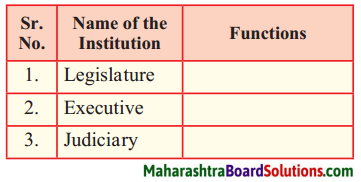
Answer:
| Sr. No. | Name of the institution | Functions |
| 1. | Legislature | To make laws |
| 2. | Executive | To implement laws, frame policies |
| 3. | Judiciary | To provide justice |
3. Explain the following statements with reasons:
Question 1.
India adopted the Parliamentary System of government.
Answer:
- The Parliamentary System of government developed primarily in England.
- The British ruled over India for about 150 years. During this period, they ruled in accordance with this system.
- So, Indians were familiar with this system of government.
- The Constituent Assembly also adopted this system after a thorough discussion.
- Hence, the framers of the Constitution made a few changes to suit the Indian situation, and adopted the Parliamentary System.
![]()
Question 2.
Discussions and deliberations are important in a Parliamentary System of government.
Answer:
- In a Parliamentary System of government, decisions are taken after discussions and deliberations.
- Members of the opposition party also participate in the discussions.
- They may support the government or point out shortcomings in the government policies.
- Laws are framed after detailed discussions on questions of public welfare. This does not happen in autocratic rule.
- Hence, to protect the welfare and freedom of common people, discussions and deliberations are important.
4. Answer the following in 25 to 30 words:
Question 1.
What is a Responsible Government?
Answer:
- The government system in which the Prime Minister and the Council of Ministers is responsible to the Legislature for all their actions and policies, is called a Responsible Government.
- In this system, the Council of Ministers has to take the Legislature into confidence during governance.
- Every decision taken by any ministry/ department is considered as the decision of the government.
- The decisions or policies of every ministry is the collective responsibility of the Council of Ministers.
- Thus, the principle of collective responsibility adopted by the Council of Ministers makes it a responsible government.
Question 2.
Enumerate the characteristics of the Presidential System of government.
Answer:
The following are the characteristics of the Presidential System of government:
- The President is directly elected by the people.
- The President has lot of powers including power to implement laws.
- The President is not dependent on the support of the Legislature.
- The Legislature and the Executive are not dependent on each other, but still they have mutual control over each other.
5. Why is the role of opposition parties important? Write your opinion.
Question 1.
Why is the role of opposition parties important? Write your opinion.
Answer:
The role of opposition parties is important in Parliamentary as well as Presidential System of government.
- The opposition parties participate in the discussions and point out the shortcomings in the policies of the government.
- The opposition parties control the Executive through their arguments based on deep study of the topics discussed in the Parliament.
- The Executive cannot behave in an irresponsible manner due to the pressure of the opposition parties.
- The alertness of the opposition parties help in avoiding wrong practices like corruption, ignoring public welfare, passing faulty laws, etc.
![]()
Have you thought of this?
- What is a parliamentary system of government?
- In India we have Prime Minister but why is there no Prime Minister in the United States of America?
- What is the difference between a Parliamentary and a Presidential system of government?
Project:
Watch the live telecast proceedings of the Lok Sabha and Rajya Sabha on the national channel Doordarshan and write your observations.
Class 8 Civics Chapter 1 Introduction to the Parliamentary Additional Important Questions and Answers
Choose the correct option and rewrite the statements:
Question 1.
The interrelationship between the Legislature, Executive and Judiciary is decided by the …….
(a) Government
(b) Presidential System
(c) Constitution
(d) Parliament
Answer:
(c) Constitution
Question 2.
The English Constitution is an …….. Constitution where governance is based on conventions.
(a) changeable
(b) unchangeable
(c) unwritten
(d) written.
Answer:
(c) unwritten
![]()
Question 3.
Sometimes, when no party gets a clear majority, ……… government is formed.
(a) Presidential
(b) coalition
(c) Military
(d) communist
Answer:
(b) coalition
State whether the following statements are True or False. Correct the False statement and rewrite:
Question 1.
Parliamentary System of government is considered as a contribution of United States of America.
Answer:
False.
Correct: Parliamentary System of government is a contribution of England.
Question 2.
In the Parliamentary System, the Legislature of the Central Government is known as the ‘Parliament’.
Answer:
True.
Question 3.
Members of the opposition party also take part in the discussion of the questions related to public welfare.
Answer:
True.
![]()
Question 4.
In the Parliamentary System, the President is directly elected by the people.
Answer:
False.
Correct: In the Presidential System, the President is directly elected by the people.
Find and write:
Complete the concept map:
Question 1.
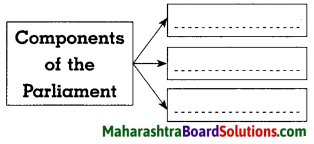
Answer:
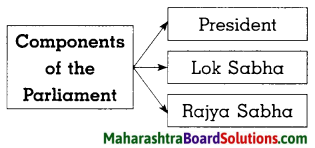
Question 2.
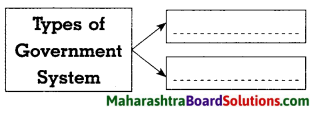
Answer:

Question 3.
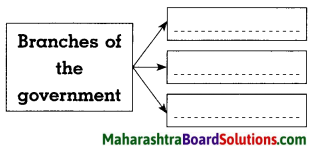
Answer:
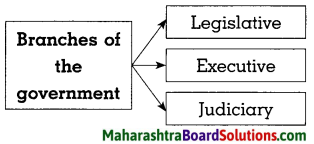
Write short notes:
Question 1.
Characteristics of Parliamentary System of India:
Answer:
The following are the characteristics of Parliamentary System adopted by India:
- The Parliament of India is composed of the President, Lok Sabha and Rajya Sabha.
- Fixed number of members of the Parliament are directly elected by the people.
- All political parties contest elections, which are held at regular intervals.
- The party having majority in Lok Sabha or a coalition government comes into power.
- The leader of the majority party becomes the Prime Minister and he selects candidates to form the Council of Ministers.
- The Executive has to perform the responsibility of its individual minister¬ship as well as the responsibility of the Legislature, for all their actions and policies.
![]()
Question 2.
Responsibilities of the Executive in India:
Answer:
The Executive in India has to fulfill following responsibilities:
- Implementing the laws passed by the Parliament.
- Framing policies for governing the nation.
- Functioning as the members of the Legislature.
- Striving to develop the nation through decisions related to the welfare of the people.
Explain the following statements with reasons:
Question 1.
No-confidence motion is an effective tool of keeping a check over the Executive.
Answer:
- In the Parliamentary System, the Executive is dependent upon the confidence of the Legislature in them.
- If the Legislature feels that the Executive does not work in accordance to its wishes, it can pass a no-confidence motion against the Executive.
- If the Legislature passes the no-confidence motion with a majority, then the Executive has to resign.
- The Constitution has provided this tool to prevent the Executive from misusing its powers.
Hence, no-confidence motion is an effective tool of keeping a check over the Executive.
Question 2.
The Parliament is of great importance in the Parliamentary System of government.
Answer:
- In the Parliamentary System of government the members of the Legislature are directly elected by the people.
- Since the elected members represent the people of the nation in the Parliament, they express and carry the hopes and wishes of the people.
- The Parliament decides the policies for the welfare of the people.
- If the Parliament feels that the Executive does not work in accordance to its wishes, it can remove the Executive from power by passing a no-confidence motion against it.
Since, the Parliament reflects the wishes and opinions of the people of the nation, it is of great importance.
![]()
Have you thought of this?
Question 1.
What is a Parliamentary System of government?
Answer:
- The Parliamentary System of government is the one where representatives are directly elected by the people.
- They are the members of the Legislature, which is also known as the Parliament.
- In this system, elections are held after fixed period.
- The party which gets the majority forms the government.
- In this system, the Executive is dependent on the confidence of the Legislature.
Question 2.
In India we have Prime Minister but why is there no Prime Minister in the United States of America?
Answer:
- In the Parliamentary System of government, the Prime Minister is the head of the Executive, i.e. the Council of Ministers.
- In the Presidential System of government, the President is the head of the Executive. ‘
- Since India has adopted the Parliamentary system, we have the post of the Prime Minister.
- Since United States of America has adopted Presidential System, they have the post of the President.
- The post of the Prime Minister does not exist in Presidential System of government.
Question 3.
What is the difference between a Parliamentary and a Presidential System of government?
Answer:
Difference between the Parliamentary and Presidential System of government is as follows:
| Parliamentary System | Presidential System |
| 1. President is the Constitutional Head. | President is the Executive Head. |
| 2. Prime Minister and Council of Ministers have more powers. | President has more powers. |
| 3. Council of Ministers is formed by the elected members of Parliament. | President is directly elected by the people. |
| 4. Parliament can remove the Prime Minister by passing a no-confidence motion. | President can be removed only by impeachment. |
| 5. Members of the Executive are also the members of the Legislature. | Legislature and Executive are not dependent on each other. |
![]()
Question 4.
Why is the role of opposition parties important? Write your opinion.
Answer:
The role of opposition parties is important in Parliamentary as well as Presidential System of government.
- The opposition parties participate in the discussions and point out the shortcomings in the policies of the government.
- The opposition parties control the Executive through their arguments based on deep study of the topics discussed in the Parliament.
- The Executive cannot behave in an irresponsible manner due to the pressure of the opposition parties.
- The alertness of the opposition parties help in avoiding wrong practices like corruption, ignoring public welfare, passing faulty laws, etc.
8th Std Civics Questions And Answers:
- Introduction to the Parliamentary System Class 8 Civics Questions And Answers
- The Indian Parliament Class 8 Civics Questions And Answers
- The Union Executive Class 8 Civics Questions And Answers
- The Indian Judicial System Class 8 Civics Questions And Answers
- The State Government Class 8 Civics Questions And Answers
- Bureaucracy Class 8 Civics Questions And Answers